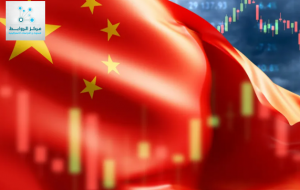BY: Shatha Kalel
Since the Chinese Communist Party (CCP) took power in 1949, China has experienced a tremendous economic transformation that has made it the world’s second-largest economy. This journey has had a significant impact on the global economy, especially under the leadership of President Xi Jinping since 2012. Xi has solidified his authority over both the party and the state, allowing him to implement a long-term vision aimed at strengthening China’s economic dominance on the global stage.
Economic Growth and Structural Challenges
Under Xi’s leadership, the Chinese economy has undergone a fundamental transformation. The country has been steered towards technological innovation, expansion in advanced industries, and global infrastructure development through initiatives like the “Belt and Road.” These policies have positively impacted economic growth, enabling China to maintain strong growth rates despite global challenges.
However, this progress hasn’t been without obstacles. China faces an economic slowdown due to reduced domestic demand and rising debt levels. Additionally, trade tensions with the United States have affected global supply chains and China’s foreign trade.
Xi’s Economic Strategy
One of the most significant features of Xi’s economic policies is the focus on self-reliance, a vision aimed at reducing dependence on external markets and boosting domestic manufacturing. China seeks to lead in technological industries such as artificial intelligence and semiconductor chips, enhancing its competitive edge internationally.
Globally, China has positioned itself as a major player through its investments in infrastructure, particularly in developing countries. These investments contribute to China’s growing role as an economic superpower, directly influencing global trade relationships.
Future Economic Challenges
Despite its significant achievements, the Communist Party under Xi’s leadership faces both internal and external challenges. The most pressing issue is the anticipated economic slowdown, along with the need to manage the fallout from the COVID-19 pandemic and ongoing trade tensions with the United States. Additionally, environmental challenges and global climate change commitments pose another obstacle, particularly regarding China’s international pledges to reduce carbon emissions.
Conclusion
Under Xi Jinping’s leadership, China has transformed into a global economic power seeking to expand its influence and achieve economic dominance. However, it faces numerous challenges that may shape its economic future. The key question remains whether China can overcome these obstacles and continue to realize its ambitious economic goals.
Economic Unit/North America Office
Al Rawabet Center for Research and Strategic Studies

